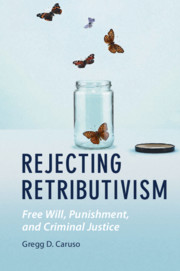Book contents
- Rejecting Retributivism
- Law and the Cognitive Sciences
- Rejecting Retributivism
- Copyright page
- Dedication
- Contents
- Acknowledgments
- 1 Free Will, Legal Punishment, and Retributivism
- 2 Free Will Skepticism
- 3 The Epistemic Argument against Retributivism
- 4 Additional Reasons for Rejecting Retributivism
- 5 Consequentialist, Educational, and Mixed Theories of Punishment
- 6 The Public Health–Quarantine Model I
- 7 The Public Health–Quarantine Model II
- 8 The Public Health–Quarantine Model III
- 9 The Public Health–Quarantine Model IV
- References
- Index
9 - The Public Health–Quarantine Model IV
Funishment, Deterrence, Evidentiary Standards, and Indefinite Detention
Published online by Cambridge University Press: 06 May 2021
- Rejecting Retributivism
- Law and the Cognitive Sciences
- Rejecting Retributivism
- Copyright page
- Dedication
- Contents
- Acknowledgments
- 1 Free Will, Legal Punishment, and Retributivism
- 2 Free Will Skepticism
- 3 The Epistemic Argument against Retributivism
- 4 Additional Reasons for Rejecting Retributivism
- 5 Consequentialist, Educational, and Mixed Theories of Punishment
- 6 The Public Health–Quarantine Model I
- 7 The Public Health–Quarantine Model II
- 8 The Public Health–Quarantine Model III
- 9 The Public Health–Quarantine Model IV
- References
- Index
Summary
In the previous chapter, I argued that the public health–quarantine model can successfully deal with concerns about proportionality, human dignity, victims’ rights, rehabilitation, and preemptive incapacitation. In this chapter, I will argue that it can also successfully deal with concerns about funishment, cost, deterrence, evidentiary standards, and indefinite detention. In the process of defending my account, I will revisit the issue of prison design, explain one important difference between the views of Pereboom and myself, and argue that high evidentiary standards and the importance of actus reus and mens rea can all be preserved.
- Type
- Chapter
- Information
- Rejecting RetributivismFree Will, Punishment, and Criminal Justice, pp. 297 - 328Publisher: Cambridge University PressPrint publication year: 2021

